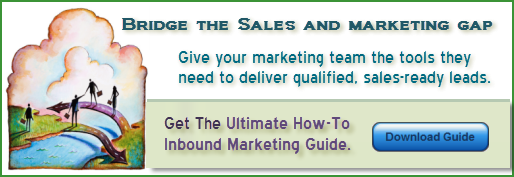Earning your reputation
HubSpot recently posted about five important steps for any inbound marketing campaign. While it was a great article, I worried that readers would walk away believing that inbound marketing was all about campaigns. While the campaign is an essential part of any marketing strategy it has an important feature I feel I must draw attention to.
Campaigns end.
If there is a fundamental difference between inbound marketing (or internet marketing, or online marketing) and traditional marketing it’s that the fruits of inbound marketing aren’t bought; they are earned. This is not a trivial difference. Perhaps the most crucial effect of this is that inbound marketing is also cumulative.
![]() You rent ads or a spot at the trade show, but you own your reputation. Just like any other asset, your reputation needs to be maintained in order for it to experience cumulative growth. Continuously building your brand and fostering relationships is one of the main advantages of online marketing.
You rent ads or a spot at the trade show, but you own your reputation. Just like any other asset, your reputation needs to be maintained in order for it to experience cumulative growth. Continuously building your brand and fostering relationships is one of the main advantages of online marketing.
This is why inbound marketing doesn’t end.
A new way of engaging
To truly break into the world of inbound marketing, you need to think of it not as a campaign or a tactic, but as a way of doing business. It’s about continuing to invest in your reputation, the relationships you have with your customers and your business partners. Any successful inbound strategy rests on at least some of the following perspectives:
Collaboration – Reputation isn’t easy to build. One of the best places to find it is by borrowing it from people and organizations that already have it. This isn’t just about a one-off guest post for a spike in traffic and a little search engine benefit.
It’s about building relationships that can be leveraged for years to come. It’s about engaging in projects that would otherwise be impossible. And it’s about earning a reputation as somebody trustworthy enough to work together with some of the biggest names in your industry.
Transparency – Businesses and consumers alike are distrustful and skeptical of commercial activity. It’s simply safer to assume that most businesses have something to hide. The business that opens up its doors and lets people know what it’s doing has a tremendous opportunity to build trust and respect. It’s also a great way to attract attention, since most knowledge is kept under lock and key.
Uniqueness – Top business professionals like Guy Kawasaki have pointed out that businesses who don’t offer anything unique are inevitably forced to compete on price. They have no option but to give people more for less. This is a process of endless outsourcing, optimization, and ultimately diminishing profit. Companies that compete by being different, rather than being cheaper have a much better chance of grabbing much needed attention and market share. Best of all, anybody who emulates you will simply be accused of copying you.
Community – Increasingly, customers don’t just come to a business for its products. They come for its personality, its attitude, and its environment.
The successful inbound business not only creates great products, it foster tight-knit, engaging communities. This is the result of asking questions as a natural byproduct of writing blogs and creating content. And then by listening, sparking discussions, and even taking the occasional stance
Ultimately, inbound marketing is about developing such authority that buyers choose to do business with you based on that reputation alone, not on any specific deal, ad, or product.
How do you think about inbound marketing? Can you think of other strategies?

